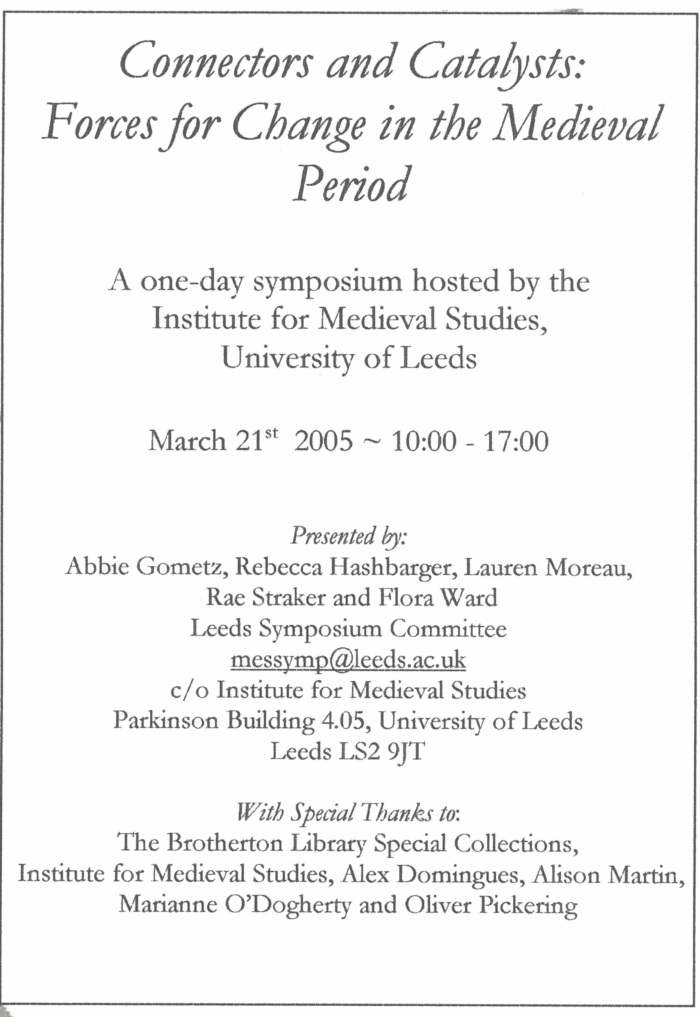Students, staff and activities: 2003-2011
The guiding principles of the IMS
In 2003, the CMS and IMI joined forces to form the Institute for Medieval Studies (IMS). This brought under one roof all activities associated with Medieval Studies at Leeds and enabled greater cohesion as we became one body.
The value of the whole thing lies as much in bringing together the teachers who are medievalists as in anything we may do for our students.
John Le Patourel
Emeritus Professor of Medieval History
Interdisciplinarity
One of the founding principles of the IMS was interdisciplinarity. The members of the Institute have been drawn from different departments, including Arabic and Islamic Studies, Archaeology, Continuing Education, East Asian Studies, English, Fine Art, French, Geography, German, History, Italian, Music, Philosophy, Theology and Religious Studies, brought together by an intellectual curiosity for the Middle Ages.
Studying the Middle Ages benefits from a broad range of skills. The staff and students of the IMS have always benefited from its rich pool of knowledge and expertise.
Community

A flyer for the IMS Postgraduate Symposium, March 2005.
Students have always been at the heart of the IMS. From its foundation the Institute was intended to provide rigorous, skills-based training to prepare students for research.
The acquisition of larger, centrally located premises gave the Institute a home, a sense of place, and a locus for staff and students to meet.
Over the years, the Le Patourel Room became a hub of collegial activities among MA and PhD students and a welcoming venue for a wide range of research activities and public events.
Postgraduates at Leeds have often been at the forefront of innovative research activities such as the Mystery Cycles, and the long-running tradition of successful postgraduate conferences, and a particularly large number of student-led reading groups including Arabic, Byzantine Greek, French, German, Italian, Old English, and Old Norse.
Internationality
From the beginning, the Institute brought together scholars whose work focused not just on Britain, but the wider medieval world. We have always sought to develop an international presence by recruiting students from around the world and by maintaining close ties with other international institutions.
We should never downplay, whatever the formal structures are, the value of crossing boundaries and getting to know people.
Joyce Hill
Emeritus Professor of Medieval Literature
The first colloquium of the Société Internationale pour l’étude du Théâtre Médiéval (SITM) was held in Leeds in 1974, at the instigation of Lynn Muir. This ‘essential and revolutionary emphasis on the value of crossing national boundaries’ was at the centre of Lynn’s vision and remains at the heart of the IMS’s mission. The IMS remains committed to fostering international academic cooperation through colloquia and research projects. It frequently hosts visiting doctoral and postdoctoral researchers from outside the UK.
The International Medieval Bibliography (IMB) and International Medieval Congress (IMC) have always been principally international endeavours. One of the key aims of the IMB was to provide access to non-Anglophone scholarship. At the first IMC in 1994 about 1/3 of participants were from Europe and 1/3 international. During the planning of the first Congress it was thought particularly important to make links with academics from Eastern European countries and ensure that they were supported in attending.
